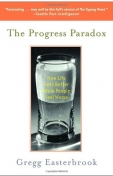BKMT READING GUIDES
The Progress Paradox: How Life Gets Better While People Feel Worse
by Gregg Easterbrook
Paperback : 400 pages
0 club reading this now
0 members have read this book
Introduction
In The Progress Paradox, Gregg Easterbrook draws upon three decades of wide-ranging research and thinking to make the persuasive assertion that almost all aspects of Western life have vastly improved in the past century–and yet today, most men and women feel less happy than in previous generations.
Detailing the emerging science of “positive psychology,” which seeks to understand what causes a person’s sense of well-being, Easterbrook offers an alternative to our culture of crisis and complaint. He makes a compelling case that optimism, gratitude, and acts of forgiveness not only make modern life more fulfilling but are actually in our self-interest. An affirming and constructive way of seeing life anew, The Progress Paradox will change the way you think about your place in the world–and about our collective ability to make it better.
Editorial Review
Ordinary middle-class Americans have often tried to assuage their jealousy of the rich by repeating the axiom "money can't buy happiness" to themselves. But according to New Republic senior editor Gregg Easterbrook, "the rich" are, in fact, those same ordinary middle-class Americans and no, they're not happy at all. Wages have soared over the past fifty years and regular citizens own large homes, new cars, and luxuries aplenty. Better still, the environment, with a few exceptions, is getting cleaner, crime is on the decline, and diseases are being wiped out as life span increases. So why do people report a sense that things are getting steadily worse and that catastrophe is imminent? Easterbrook presents a few psychological rationales, including "choice anxiety," where the vastness of society's options is a burden, and "abundance denial," where people somehow manage to convince themselves that they are deprived of material comforts. The sooner we accept how good we have it, the better off the whole world will be, he says, because if we would just realize that we have this wealth, we could be using it to alleviate hunger, provide health care for the millions who lack it, and otherwise address the ills that actually do exist. While at times the book's attempts to make the world a better place seem a bit of a stretch, it's admirable that Easterbrook is willing to make that stretch and not suggest people simply light up cigars and bask in their newly discovered joys. One might look a bit askance at some of Easterbrook's sunny perspectives on our societal fortunes--he celebrates rampant consumerism while skating past the rampant consumer debt that lies beneath it, for instance--but it's hard to deny that the pessimistic viewpoint is much more widely stated than that of optimists. Is the glass really half empty or should we, as Easterbrook indicates, enjoy the wonderful world in which we secretly live? --John MoeDiscussion Questions
No discussion questions at this time.Book Club Recommendations
Recommended to book clubs by 0 of 0 members.
Book Club HQ to over 90,000+ book clubs and ready to welcome yours.
Get free weekly updates on top club picks, book giveaways, author events and more








